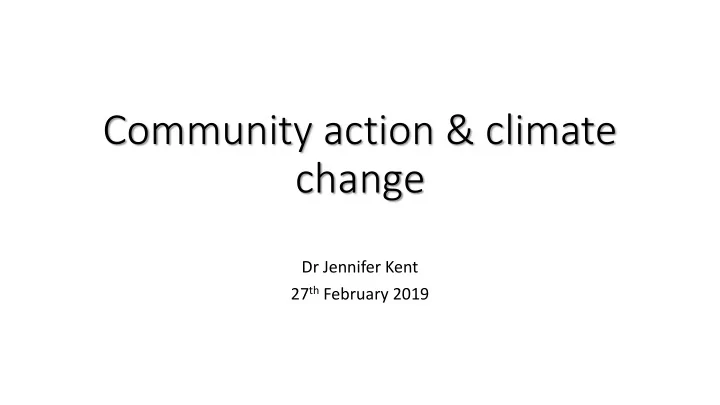

Community action & climate change Dr Jennifer Kent 27 th February 2019
Acknowledgement of Country I acknowledge the Bedegal people who are the traditional custodians of the land we are meeting on and pay my respects to their elders past, present and future. I also acknowledge that sovereignty was never ceded over this land.
Australian climate politics 2019 Australian Climate Policy 2019 – not another groundhog day! – not groundhog day again!
Be Climate Clever: I can do that! http://youtu.be/02fGSN7aPhQ
Key concept 1 The Anthropocene
The Anthropocene The Anthropocene, populised by Crutzen & Stoermer (2000) refers to a proposed new geological age, separate to the Holocene (the last 11,700 years stable geologic period where humankind has flourished) and representing a new period where for the first time humans represent the major force shaping the Earth’s environment.
Key concept 2: Polycentrism
Economic theories of collective action Tragedy of the commons (Garret Polycentrism (Elinor Ostrom, 2009): Hardin, 1968): Nobel prize winner Ostrom Self interest will lead to the demonstrated that collective groups exhaustion of a common resource to can be self regulating to allow the the detriment of all (now & into the common resource to be shared & future). maintained. • Implies requirement for external • Consist of polycentric spaces that regulation by some global can be at national, regional or local authority to monitor actions & scale. Key is cooperation, trust & apply sanctions. reciprocity & face-to-face interaction.
Key concept 3 Planetary Boundaries (Steffen et al. 2015)
The planetary boundaries framework first published in 2009, introduced us to the possibility of distilling a complex Earth system – of land, oceans, atmosphere and life – into 9 global-scale dimensions responsible for keeping the Earth in its current hospitable state
The bottom line: Big change is happening fast “The Great Acceleration” (Steffen 2015)
The bottom line: Big change needs to happen fast Transformative change required Need to disrupt/ destroy existing fossil fuel hegemony (Geels 2014)
Issues of individual responsibility Influence/ change individual behaviour. However scale of action taken does not match what’s required. Easy lifestyle changes are readily adopted whilst most difficult are not.
Issues of individual responsibility Expected that consumers make rational choices based on their beliefs . Jackson (2005, p. 35) states three assumptions that underlie RCT : “1) that choices are rational; 2) that the individual is the appropriate unit of analysis in social action; and 3) that choices are made in the pursuit of individual self- interest”.
Issues of individual responsibility Value-action gap People’s environmental values and the actions they are willing to take often don’t match = ‘value -action gap ’ ( Kollmus & Agyeman 2002). People feel that they have little or no control over complex global issues of sustainability, such as climate change (Ashworth et al. 2011).
Issues of individual responsibility Technological innovation needs to be considered within its social & cultural contexts For e.g. “hidden” power usage of appliances as standby power is now contributing to about 10% of household energy usage. Understanding power usage in the context of social practices – such as surge in energy use when every one puts on the kettle for a cup of tea after popular soapie finishes
Sustainability Transitions Theory (Grin et al. 2010) • Recent shifts from applying STT to socio-technical innovations to consider social change from the bottom up (Grassroots Innovations) • Multilevel Perspective (MLP) – Geels 2002, 2005, 2011 – key influence • Provides an avenue for exploring the complex spatial architecture of climate change governance (across vertical & horizontal scales)
Grassroots Innovations “Networks of activists and organisations generating novel bottom-up solutions for sustainable development; solutions that respond to the local situation and the interests and values of the communities involved” (Seyfang & Smith 2007, p. 585).
Sustainability Transitions Theory Explains behaviour change from a collective or social perspective Explains how innovations emerge and translate across scales (niche-regime- landscape) (Geels) Supports radical forms of change (step- change rather than incremental) based on social learning (Seyfang et al. 2010) doesn’t address the role of civil society X
Deliberative Democracy
Social innovations as citizen-led transformations
Activating Agency • Re-balancing responsibility from an individualised focus to a shared one – through a social contract between states & their citizens • Implies greater democratic deliberation between states & their publics • Shift of power from governments and global institutions to civil society
Recommend
More recommend